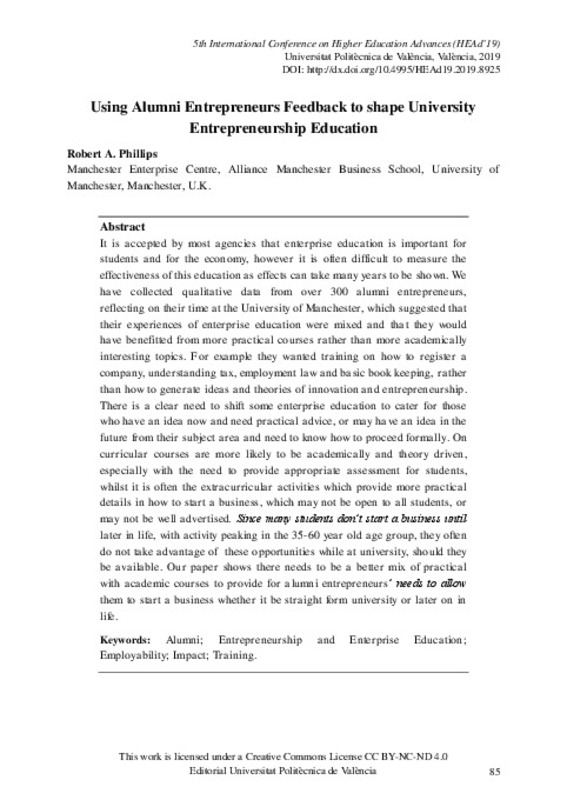JavaScript is disabled for your browser. Some features of this site may not work without it.
Buscar en RiuNet
Listar
Mi cuenta
Estadísticas
Ayuda RiuNet
Admin. UPV
Using Alumni Entrepreneurs Feedback to shape University Entrepreneurship Education
Mostrar el registro sencillo del ítem
Ficheros en el ítem
| dc.contributor.author | Phillips, Robert
|
es_ES |
| dc.date.accessioned | 2019-09-04T06:57:33Z | |
| dc.date.available | 2019-09-04T06:57:33Z | |
| dc.date.issued | 2019-07-05 | |
| dc.identifier.isbn | 9788490486610 | |
| dc.identifier.issn | 2603-5871 | |
| dc.identifier.uri | http://hdl.handle.net/10251/124956 | |
| dc.description.abstract | [EN] It is accepted by most agencies that enterprise education is important for students and for the economy, however it is often difficult to measure the effectiveness of this education as effects can take many years to be shown. We have collected qualitative data from over 300 alumni entrepreneurs, reflecting on their time at the Univeristy of Manchester, which suggested that their experiences of enterprise education were mixed and that they would have benefitted from more practical courses rather than more academically interesting topics. For example they wanted training on how to register a company, understanding tax, employment law and basic book keeping, rather than how to generate ideas and theories of innovation and entrepreneurship. There is a clear need to shift some enterprise education to cater for those who have an idea now and need practical advice, or may have an idea in the future from their subject area and need to know how to proceed formally. On curricular courses are more likely to be academically and theory driven, especially with the need to provide appropriate assessment for students, whilst it is often the extra curricular activities which provide more practical details in how to start a business, which may not be open to all students, or may not be well advertised. Since many students don’t start a business until later in life, with activity peaking in the 35-60 year old age group, they often do not take advantage of these opportunities while at university, should they be available. Our paper shows there needs to be a better mix of practical with academic courses to provide for alumni entrepreneurs’ needs to allow them to start a business whether it be straight form university or later on in life. | es_ES |
| dc.format.extent | 9 | es_ES |
| dc.language | Inglés | es_ES |
| dc.publisher | Editorial Universitat Politècnica de València | es_ES |
| dc.relation.ispartof | HEAD'19. 5th International Conference on Higher Education Advances | es_ES |
| dc.rights | Reconocimiento - No comercial - Sin obra derivada (by-nc-nd) | es_ES |
| dc.subject | Higher Education | es_ES |
| dc.subject | Learning | es_ES |
| dc.subject | Educational systems | es_ES |
| dc.subject | Teaching | es_ES |
| dc.subject | Alumni | es_ES |
| dc.subject | Entrepeneurship and Enterprise Education | es_ES |
| dc.subject | Employability | es_ES |
| dc.subject | Impact | es_ES |
| dc.subject | Training | es_ES |
| dc.title | Using Alumni Entrepreneurs Feedback to shape University Entrepreneurship Education | es_ES |
| dc.type | Capítulo de libro | es_ES |
| dc.type | Comunicación en congreso | es_ES |
| dc.identifier.doi | 10.4995/HEAD19.2019.8925 | |
| dc.rights.accessRights | Abierto | es_ES |
| dc.description.bibliographicCitation | Phillips, R. (2019). Using Alumni Entrepreneurs Feedback to shape University Entrepreneurship Education. En HEAD'19. 5th International Conference on Higher Education Advances. Editorial Universitat Politècnica de València. 85-93. https://doi.org/10.4995/HEAD19.2019.8925 | es_ES |
| dc.description.accrualMethod | OCS | es_ES |
| dc.relation.conferencename | Fifth International Conference on Higher Education Advances | es_ES |
| dc.relation.conferencedate | Junio 26-28, 2019 | es_ES |
| dc.relation.conferenceplace | València, Spain | es_ES |
| dc.relation.publisherversion | http://ocs.editorial.upv.es/index.php/HEAD/HEAD19/paper/view/8925 | es_ES |
| dc.description.upvformatpinicio | 85 | es_ES |
| dc.description.upvformatpfin | 93 | es_ES |
| dc.type.version | info:eu-repo/semantics/publishedVersion | es_ES |
| dc.relation.pasarela | OCS\8925 | es_ES |








